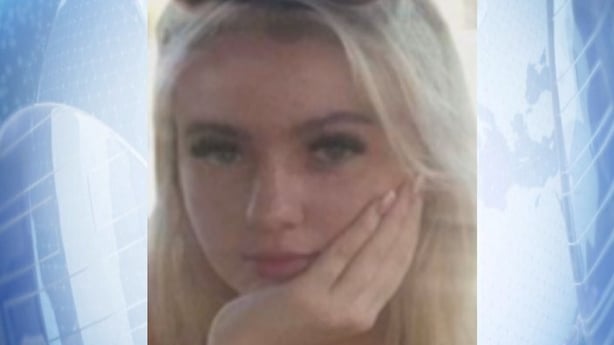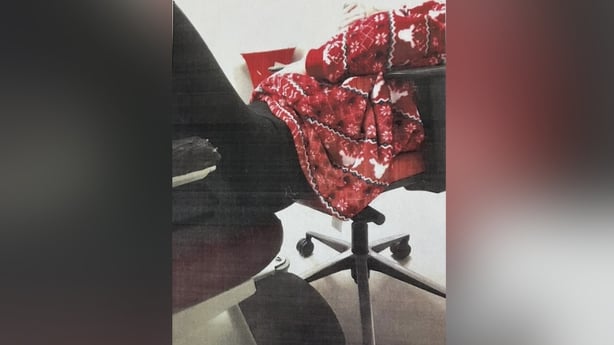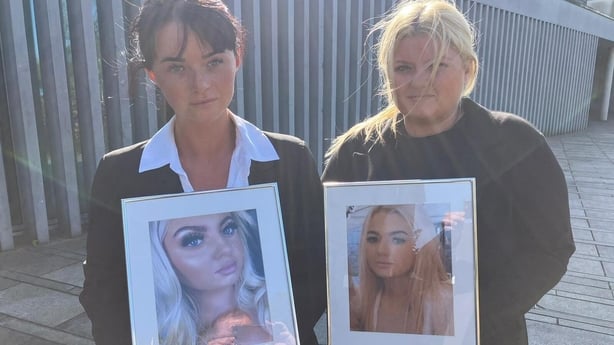The clinical nurse manager who was on duty at the emergency department at University Hospital Limerick (UHL) on the night Aoife Johnston presented has described conditions there as being "akin to a war zone".
Katherine Skelly has been giving evidence at the inquest into the 16-year-old's death, which has opened at Kilmallock Courthouse in Co Limerick.
Ms Johnston, who was from Shannon, Co Clare, experienced a 12-hour wait at the hospital's emergency department following her arrival there on 17 December 2022.
She died on the afternoon of 19 December 2022.
Ms Johnston was diagnosed with suspected bacterial meningitis and developed sepsis.
The inquest, before Limerick Coroner John McNamara, is scheduled to run for four days. It will examine the care provided to Aoife Johnston at UHL on the 17 and 18 of December 2022, with some 25 witnesses scheduled to give evidence.
As proceedings got under way this morning, two portraits of Ms Johnston were brought into the Courthouse by her family. They are being displayed on a desk at the top of the court room.
In her deposition, Ms Skelly outlined how she worked the previous night shift when there were 130 patients in the emergency department. While this was "unsafe by any standards", the situation had worsened by 17 December, with 160 patients waiting to be seen.
Ms Skelly said there were just 15 nurses on duty, when the correct allocation was 20.
"We could have done with 30, such was the volume of patients," she said.

She detailed how all areas in the emergency department were understaffed and every conceivable space was taken up. Patients were sitting and lying in every nook and cranny, waiting areas were overflowing and trolleys were blocking toilet doors.
Ms Skelly said the paediatric waiting area was "grossly overcrowded".
"We were in a crisis" she said, adding that the level of trauma injuries on the night, mostly relating to falls on icy footpaths, was such that it necessitated the criteria that would be used for a major incident in the region.
Having identified such serious risks to patient safety, Ms Skelly said she phoned two consultants to inform them of the situation. She said Dr Jim Gray declined a request to come into the hospital and that the paediatric consultant on call initially declined a similar request but did subsequently attend sometime after 11pm.
Ms Skelly said the staffing level was "alarmingly unsafe" and the risk to patient safety was at a level she had not encountered before.
"I literally did not have moment to draw my breath."
She told hospital management that the situation in the emergency department was critically unsafe and needed to be addressed as a matter of urgency. Despite this, there were 190 patients waiting to be seen when she reported for duty the following evening.
UHL 'too acustomed to crisis', inquest told
Ms Skelly said the impact of these conditions meant staff worked under "unimaginable stress". In spite of their best efforts, many people left the hospital without being seen. She said some received "sub standard care" but no patient got the care they needed.
She added that UHL had become "too accustomed to crisis" and that staff were "constantly firefighting" just to provide basic care to the volume of patients presenting there.
Under cross examination by counsel for the Johnston family, Ms Skelly said she had been devastated by the death of the 16-year-old.
"I never worked in A&E after that weekend," she said, stating that she left her job at the hospital because of the events on 17 and 18 December 2022.
"It absolutely broke me professionally and personally that that poor girl died."
We need your consent to load this rte-player contentWe use rte-player to manage extra content that can set cookies on your device and collect data about your activity. Please review their details and accept them to load the content.Manage Preferences
Ms Skelly said she had tried to get more resources through the night to assist patients. She said she was aware of "Aoife and other patients with sepsis markers" who were waiting for a long time to be seen.
At 3.45am, she looked for more support to relieve pressure in the emergency department but was informed at that time that no trolleys would be going onto wards overnight.
Ms Skelly agreed that Aoife Johnston's condition got steadily worse as the night progressed.
She said antibiotics needed to be administered to treat sepsis. Instead, nurses were told to provide paracetamol and antibiotic treatment was not given until 7.15am on 18 December, fourteen hours after Ms Johnston arrived at the emergency department.
Aoife's mother 'watched our daughter die'
Aoife Johnston's mother Carol told her inquest that she watched her daughter die and she "wouldn't wish that on anyone".
Her father also told the inquest that his daughter "got sicker and sicker and sicker".
A photograph of Aoife Johnston lying across two chairs in the UHL emergency department hours before she died was shown at the inquest.

Legal representatives for the Johnston family have expressed concerns that an independent report into the death had not been presented to the family.
Damien Tansey SC said the family were requesting that the coroner direct that this interim report be made available to them.
Conor Halpin SC, for UHL, said the report in question was not a matter of evidence for the purposes of the inquest.
He said UHL had no difficulties with the report being used as an aide memoire, but that it was not appropriate for the Coroner to make a ruling in relation to it.
Mr Tansey has also raised concerns about the availability of some witnesses over the course of this week.
He said the nurse who had sole responsibility at nursing level, in relation to the care of Aoife Johnston, would not be available to attend. The inquest heard she is abroad at present.
Mr Tansey said arrangements should have been made for her to give evidence remotely.
He described the nurse as being of fundamental importance to the proceedings and said it was most unsatisfactory that she could not be cross examined.
The family felt this was "strategically convenient", he said, and contended that it was inconceivable that the nurse in question was not available to give evidence.
Mr Halpin said the issue had been addressed in pre-inquest hearings. He said the hospital had made all reasonable efforts to deal with this but had no powers to compel witnesses.
The coroner acknowledged the nurse was an important witness but he said she had made a detailed deposition which would be put on the record. He said he could make no order for her to attend or give evidence.
The coroner said if issues remained at the end of the proceedings, he was willing to revisit the situation.
Some 25 witnesses are scheduled to give evidence to the inquest over the coming days.
It will examine the care provided to Aoife Johnston, at UHL, on the 17 and 18 of December 2022.
Mr Tansey said the situation in the emergency department was "chaotic" by any measure.
He said Ms Johnston had an "utter and profound need of healthcare".

Formal apology on behalf of HSE
Before her parents gave their depositions, Mr Halpin read a letter to Carol and James Johnston, from HSE Chief Executive Bernard Gloster.
In it, he made a formal apology on behalf of the HSE, for the failure in relation to her care.
The HSE says this was a failure of significant proportions with "clear and catastrophic consequences."
The inquest also heard the content of a second letter to the Johnston family from the CEO of UHL, Professor Colette Cowen, in which she offered sincere apologies for the failings made prior to Aoife’s death.
She said the hospital acknowledged the "devastating consequences" that followed "missed opportunities".
Ms Johnston’s father, James, was the first witness to give evidence.
He detailed how his daughter felt unwell on the afternoon of 17 December 2022. She was brought to a doctor on call service, who advised that she be brought to hospital.
The family arrived at the emergency department before 5pm and Ms Johnston was triaged after 7pm.
Ms Johnston’s skin was blotchy and she was vomiting. There was no trolley available.
Mr Johnston said his daughter was screaming in agony and he repeatedly sought further medical attention for her.
After she was taken for an x-ray, she was "physically unable to stand".
'Sicker and sicker and sicker'
She was reviewed by a doctor at 6am, on 18 December, who said she would be treated for suspected meningitis.
The family was advised that Aoife Johnston would be put into an induced coma.
She was moved to intensive care and the family were subsequently told her condition had deteriorated further and that "nothing could be done".
Aoife Johnston died on Monday 19 Dec 2022.
Under cross examination by Mr Tansey, Mr Johnston said he was begging for help, as his daughter "got sicker and sicker and sicker" as the night went on.
Mr Johnston said hospital staff provided "no help whatsoever".
Carol Johnston said she reviewed the admission letter provided by Shannondoc on the way to the hospital, on Saturday 17 December 2022.
She said there were a huge number of trolleys in the emergency department at the time they arrived.
Mrs Johnston said her daughter was moved into what appeared to be a storage room.
She was "violently vomiting pure green liquid" and screaming in agony, with pain in her head and right leg, as people outside the room repeatedly asked nurses and doctors to assist her.
Soon after she was reviewed by a doctor at 6am on 18 December, she was no longer able to communicate and her limbs were moving involuntarily.
The family were told there was no brain activity.
Mrs Johnston told the court "we watched our daughter die. I wouldn’t wish that on anyone".
She rejected suggestions that Aoife had shown some signs of improvement after her arrival in hospital.
"We told her she was in the best place for her, but she wasn't," Mrs Johnston said.
"I never thought Aoife was going to die."
Situation in emergency department 'chaotic'
The inquest also heard the deposition of Dr Mohammed Hassan, a registrar in emergency medicine who was on duty in the emergency department.
He was rostered in the resuscitation room, which he said was very busy dealing with patients presenting with serious illness who needed immediate intervention.
Dr Hassan said he was not involved directly or indirectly in the care of Aoife Johnston and her condition was not raised directly with him.
He told the court that "sepsis was a broad term so it depended on the clinical condition, sometimes a patient in severe pain would have more priority than a sepsis patient."
When it was put to him by Mr Tansey that Aoife Johnston was in urgent need of treatment, Dr Hassan said that could have been provided in 'Zone A' and did not necessarily require transfer to the resus area.
He said he could not recall any conversation with nurse Ciara McCarthy asking him to review Ms Johnston.
"I'd say it's unlikely that it happened," he said.
In her deposition, which was read to the court today, she maintained she had spoken to Dr Hassan and asked him to review Ms Johnston but that he was busy and to continue administering paracetamol.
Amid further questioning from Damien Tansey, the doctor agreed that the situation in the emergency department was chaotic, with a large number of people seeking treatment.
Proceedings will resume in the morning.







